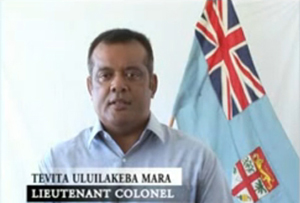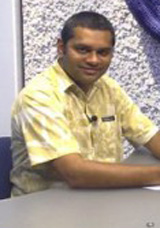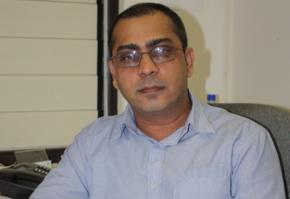
AUCKLAND (Pacific Media Watch): While Fiji and Tonga are in a diplomatic face-off over the defection of Lieutenant-Colonel Ratu Tevita Uluilakeba Mara, Fiji journalists have been weaving in and around government control to bring the story to the world.
 The reporting of the event was first picked up in New Zealand by Fairfax's Stuff.co.nz and Pacific Scoop last Saturday.
The reporting of the event was first picked up in New Zealand by Fairfax's Stuff.co.nz and Pacific Scoop last Saturday.
But for a country that has draconian censorship laws, some of Fiji’s own news media have deftly overcome some tricky challenges.
In fact, the government-owned Fiji Broadcasting Corporation and news director Stanley Simpson have been posting regular updates of an ever-more intriguing crisis by sticking to the facts - and no speculation.
For a government-run outfit, observers say it has succeeded in toeing the fine line between unbiased reporting and staying clear of the regime’s harsh media penalties.
Breaking reports
Fiji Broadcasting Corporation first reported yesterday that the claimed "distress signals" that Mara was said to have made were not picked up by Australia, New Zealand, or Fiji authorities.
Even the nearby HMNZS Otago could not report hearing it.
Some serious digging around led to their next report today that Ratu Mara had been at a Kadavu resort hours before being allegedly rescued miles away in the Southern Lau islands group.
Simpson sourced Nagigia Island resort chef Brian Batini who confirmed Mara was at the resort and even the room he stayed in.
Dev Sachindra followed up later today with breaking news that the man Mara was seen with had been detained for questioning. He quoted Fiji Military Land Force Commander Colonel Mosese Tikoitoga who said fishermen who saw the Tongan vessel in Fiji waters were talking to police as well.
Former University of the South Pacific journalism head Shailendra Singh, currently based in Brisbane doing media doctoral research, praised the efforts of the Fiji media but lamented that they could be doing much more.
“The media is doing the best job it can under a restrictive climate,” he said. “It is a big story in Fiji.”
“But they are deafeningly silent about the potential impact of Mara’s falling out and ‘defection’ from the government.”
Getting the facts right
Simpson said his journalists tracked down the most up-to-date information on Ratu Mara and the events at Kadavu without getting into commentary on the political situation.
“When the story broke, our ultimate aim was to establish the facts. That was what took us to Kadavu.
“Apart from the extradition, our aim was to try to independently verify who was telling the truth about the circumstances that led to Mara’s escape to Tonga.
“We think we now know how Mara fled to Tonga, but our job is to report what we have been able to gather, and leave it to the public to decide.”
Simpson said he aimed to report freely but has to be mindful of the Public Emergency Regulations.
“We have to report within the current media regulations governing the country – but maintain our communication lines open to all parties,” he said.
“There are lively discussions in the newsroom about what we can pursue, what we can run, what we can get away with, and what could get us into trouble.”
Ignoring the 'propaganda war'
Simpson said he strictly avoided any information on the anonymous blogs and that it was useless to engage in the so-called “propaganda war”.
“What Mara is saying on blogs and international media, we can’t report, and Mara himself should understand that as he lived here,” he said.
“We report what we can establish, using various means and networks.”
Singh agreed that the public are best served with facts, and by now are used to “reading between the lines”.
“They are quite astute at working out what is really happening on the basis of what information is not being published,” he said.
“Very few people would believe, for instance, that this was a simple rescue mission as claimed by Tonga, and reported by the media. Many people would be wondering about Australia and New Zealand’s role for instance.”
Australian media ‘silence’
But Singh said the Australian media were not asking those kinds of questions.
“The media does not seem to be investigating the rumours of Australian and New Zealand complicity,” he said.
“It seems to have slipped under their radar.”
Singh said that although it was “pure speculation”, some sort of investigation was warranted.
“They need to be careful about what they start or unleash, and the possible consequences. An implosion in Fiji will not do anyone any good.”
Singh said the country’s economic situation, coupled with the current crisis, would further undermine the government, which until recently seemed comfortably in control. But he put Fiji’s situation in the broader context of the Pacific region.
“In the last two decades Fiji has had four coups and a mutiny. While the loss of lives has been small, the country has been scarred - but not to the extent of the Solomon Islands, where the deadly ethnic conflict caused deep divisions and hardened attitudes.
“Any more violence will inflict further damage on Fiji’s fragile social fabric.”
Singh had some good advice for countries involved in Fiji’s political situation.
“An orderly transition to democracy is what most people desire and no effort should be spared towards this end.”



